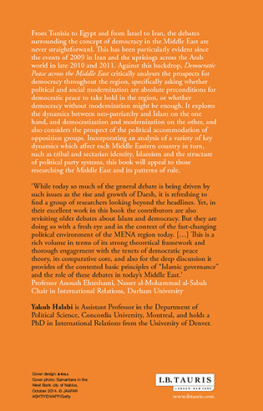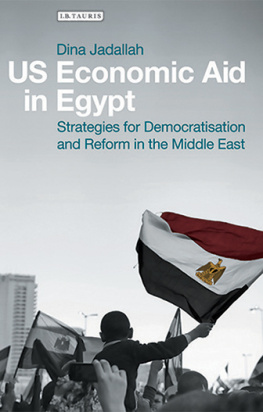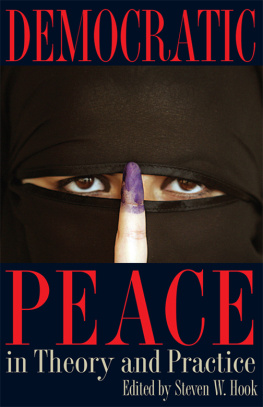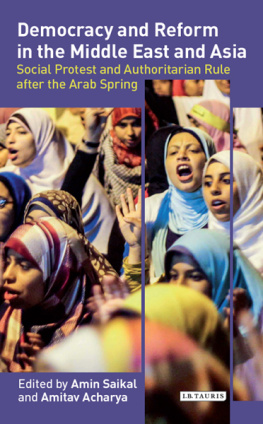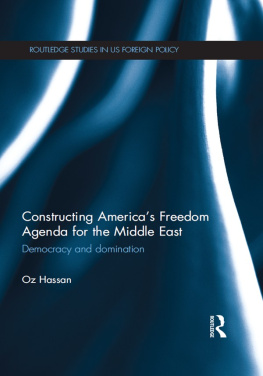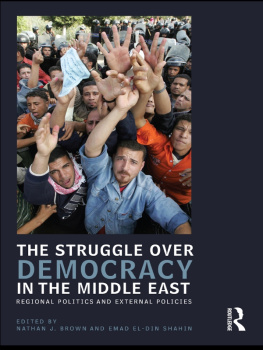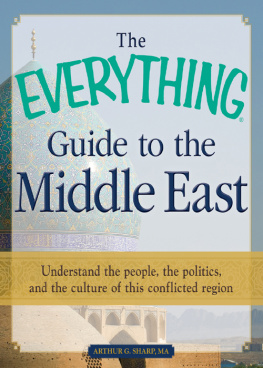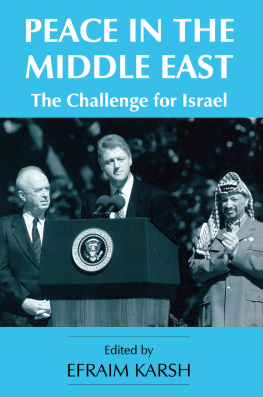
Yakub Halabi is Assistant Professor in the Department of Political Science, Concordia University, Montreal, and holds a PhD in International Relations from the University of Denver.
The debate about the Arab uprisings - the causes, their nature and drivers, their social base, the political environment of the disrupted states, the role of ideology, the influence of non-state actors and Islamist political parties and movements continues to rage just as the security crises in several transition countries deepen to affect the geopolitics of the entire region. While today so much of the general debate is being driven by such issues as the rise and growth of Daesh, it is refreshing to find a group of researchers looking beyond the headlines. Yet, in their excellent work in this book the contributors are also revisiting older debates about Islam and democracy. But they are doing so with a fresh eye and in the context of the fast-changing political environment of the MENA region today. The detailed case studies tell the unique stories of several important MENA countries, but they do much more than that, as in each case the contributors also provide fascinating analysis of the foreign policy implications of the democratic/political tensions being played out. This is a rich volume in terms of its strong theoretical framework and thorough engagement with the tenets of democratic peace theory, its comparative core, and also for the deep discussion it provides of the contested basic principles of Islamic governance and the role of these debates in today's Middle East. The volume makes a real effort to help us theorize more fully the dynamism of the MENA region, to shed light on the dark corners of the toolkit as it were, for which we should all be grateful.
Professor Anoush Ehteshami, Nasser al-Mohammad al-Sabah Chair in International Relations, Durham University
DEMOCRATIC
PEACE ACROSS
THE MIDDLE
EAST
Islam and Political Modernization
Edited by
Y AKUB H ALABI

Published in 2016 by
I.B.Tauris & Co. Ltd
London New York
www.ibtauris.com
Copyright Editorial Selection, Introduction and Conclusion 2016 Yakub Halabi
Copyright Individual Chapters 2016 Uriel Abulof, Faten Ghosn-Halawi, Ouzhan Gksel, Yakub Halabi, Bassem Hassan, Mojtaba Mahdavi, Gareth Stansfield, and Bassam Tibi
The right of Yakub Halabi to be identified as the editor of this work has been asserted by the editor in accordance with the Copyright, Designs and Patents Act 1988.
All rights reserved. Except for brief quotations in a review, this book, or any part thereof, may not be reproduced, stored in or introduced into a retrieval system, or transmitted, in any form or by any means, electronic, mechanical, photocopying, recording or otherwise, without the prior written permission of the publisher.
Every attempt has been made to gain permission for the use of the images in this book. Any omissions will be rectified in future editions.
References to websites were correct at the time of writing.
Library of Modern Middle East Studies 172
ISBN: 978 1 78453 206 2
eISBN: 978 0 85772 882 1
ePDF: 978 0 85772 819 7
A full CIP record for this book is available from the British Library
A full CIP record is available from the Library of Congress
Library of Congress Catalog Card Number: available
To the victims of the Arab Spring who sacrificed their lives for the creation of democracy and a New Middle East free of tyranny.
CONTENTS
Yakub Halabi
Uriel Abulof
Ouzhan Gksel
Faten Ghosn-Halawi
Mojtaba Mahdavi
Gareth Stansfield
Bassem Hassan
Yakub Halabi
Bassam Tibi
Yakub Halabi
LIST OF ILLUSTRATIONS
Figures
Reported deaths from organized violence in the Middle East and North Africa (19892011).
Trends in freedom in the Middle East and North Africa (201013).
Tables
Logistic regression for the occurrence of civil war on the basis of regime type (semi-democracies as omitted group), comparing MENA and the world.
Logistic regression for the occurrence of civil war on the basis of regime type (democracy degree as a continuous variable), comparing MENA and the world.
LIST OF CONTRIBUTORS
Uriel Abulof is a senior lecturer in the Department of Political Science at Tel Aviv University and a senior research fellow in the Woodrow Wilson School of Public and International Affairs at Princeton University.
Faten Ghosn-Halawi is Associate Professor of Political Science in the School of Government and Public Policy, the University of Arizona.
Ouzhan Gksel is a lecturer in the Department of Political Science and International Relations, Istanbul 29 Mayis University, Istanbul, Turkey.
Bassem Hassan is Senior Lecturer in the Department of Political Science at the University of Colorado Denver. He holds a PhD in International Studies from the University of Denver.
Mojtaba Mahdavi is the Edmonton Council of Muslim Communities (ECMC) Chair of Islamic Studies and Associate Professor in the Department of Political Science, University of Alberta, Canada.
Gareth Stansfield is Professor of Middle East Politics and the Al-Qasimi Chair of Arab Gulf Studies at the University of Exeter, where he is also the Director of the Institute of Arab and Islamic Studies (IAIS) and Director of Research of the Strategy and Security Institute (SSI). He is also a senior associate fellow with special reference to the Middle East and Islamic world at the Royal United Services Institute (RUSI).
Bassam Tibi is Professor Emeritus of International Relations at the University of Gttingen, Germany. He taught at this university from 1973 until his retirement in 2009 and served as the Director of the Center of International Affairs with a focus on Islamology.
INTRODUCTION
Yakub Halabi
Much hope was placed in the popular-led and grassroots revolutions for democratic change of 2011 that garnered the name of the Arab Spring. With the protests symbolizing local mobilization against tyranny and authoritarianism, many believed this was the start for meaningful change in the region. Four years later, have such changes been witnessed, and if so, what has been the substance of such changes for freedom, peace and human rights in the region?
This edited volume examines whether the democratic wave that swept the Middle East following the Arab Spring of January 2011 will lead to democratic peace across this region. The contributors to this volume make reference to three types of democratic peace: interstate peace in dyad relations between two democracies; inter-civilizational democratic peace that could prevail between two or more democracies that belong to different civilizations, and finally domestic democratic peace.
Mainstream literature of the democratic peace theory (DPT) refers mainly to inter-state peace; namely whether two democracies usually manage to solve their disputes in a peaceful manner and thus refrain from using force against one another. We argue that this type of literature ignores, or abstracts from, the cultural attributes of these political units and focuses solely on their type of regime; something that denies the variability that legitimately exists. Some call this type of literature institutional democratic peace as it focuses on the political structure of democracies; namely, their democratic institutions.
Next page
